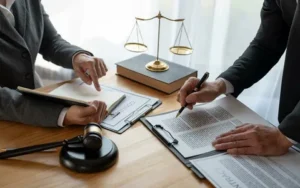The concept of justice is not new to Persian culture; it is a principle woven into millennia of history, poetry, and philosophy. From the ancient edicts of Cyrus the Great, who established one of the world’s first charters of human rights, to the verses of Rumi and Hafez that speak of fairness and truth, the pursuit of justice is a deeply ingrained value. In the bustling, modern metropolis of New York City, this enduring spirit finds new expression through the work of Persian lawyers who navigate one of the most complex legal systems in the world. They are more than just attorneys; they are the modern custodians of an ancient legacy, applying timeless principles to contemporary challenges.
These legal professionals carry with them a cultural inheritance that views justice not merely as a set of rules, but as a moral imperative. This perspective shapes their approach to the law, infusing their practice with a profound sense of duty and empathy. For them, a legal case is not just a file to be processed but a human story that deserves to be heard and understood. This dedication is reshaping the legal landscape of New York, one client at a time, by building bridges between cultures and championing a more equitable form of justice.

From Ancient Principles to Modern Practice
The historical roots of Persian justice emphasize fairness, compassion, and the protection of the vulnerable. This ethos is particularly visible in the work of Persian lawyers specializing in areas like immigration and family law. Consider the story of an Iranian journalist seeking asylum in the United States. To an outside observer, their case might appear as a collection of documents and deadlines. But a Persian lawyer sees the deeper narrative. They understand the unspoken cultural cues, the political subtext, and the personal sacrifices involved in speaking out against an oppressive regime.
This shared understanding is transformative. The lawyer can translate not just the client’s words but their entire experience for an American court. They can explain why certain evidence might be missing or why the client hesitated to share certain details, framing the narrative in a way that is both legally compelling and culturally authentic. This ability to contextualize a client’s story is a powerful tool for justice, ensuring that a person’s fate is not decided by cultural misunderstandings. It is a modern reflection of an age-old commitment to giving a voice to the voiceless.
Bridging Divides in a Global City
In a multicultural hub like New York, the potential for miscommunication is immense, especially within the rigid confines of the law. Persian lawyers act as crucial intermediaries, bridging the gap between American legal standards and the cultural expectations of their clients. This role is vital in business law, where different cultural approaches to contracts and negotiations can lead to conflict.
For instance, many Middle Eastern cultures place a high value on personal relationships and verbal agreements in business. A lawyer unfamiliar with this might dismiss a client’s concerns or fail to appreciate the importance of building trust before diving into legal formalities. A Persian lawyer, however, can navigate this dynamic with skill. They can honor their client’s cultural approach while gently guiding them through the necessities of American contract law, explaining the importance of written agreements in a way that respects their client’s perspective. This prevents misunderstandings that could derail promising partnerships and fosters smoother cross-cultural business collaborations. By blending legal expertise with cultural intelligence, they facilitate commerce and build lasting connections between diverse communities.

Community Advocacy and Mentorship
The commitment of Persian lawyers extends far beyond their billable hours. Many feel a deep-seated responsibility to uplift their community, embodying the principle that justice is a collective pursuit. They often become pillars of support, offering guidance to newly arrived immigrants, small business owners, and families navigating personal crises. This can involve anything from translating a lease agreement for an elderly couple to representing a family in a complex child custody case.
Organizations like the Iranian American Bar Association (IABA) provide a formal structure for this community-focused work. The New York chapter serves as a network for mentorship, pro bono services, and advocacy. Senior lawyers guide the next generation, ensuring that the values of service and cultural competence are passed down. They organize free legal clinics for those who cannot afford representation and speak out on issues that affect the broader diaspora. This work is not for recognition; it is driven by a genuine desire to ensure that everyone, regardless of their background or resources, has access to justice. This commitment reinforces the community’s social fabric and ensures its members can thrive.
In the end, the role of Persian lawyers in nyc law firms is a powerful testament to an enduring spirit of justice. They carry forward a legacy that is thousands of years old, applying its core tenets of fairness, empathy, and truth to the challenges of today. Their work enriches the legal profession by bringing in diverse perspectives and fosters a more inclusive society by ensuring that all voices are heard. In the courtrooms, boardrooms, and neighborhoods of New York, they are not just practicing law—they are honoring a profound cultural heritage and proving that the pursuit of justice is a timeless, universal human endeavor.